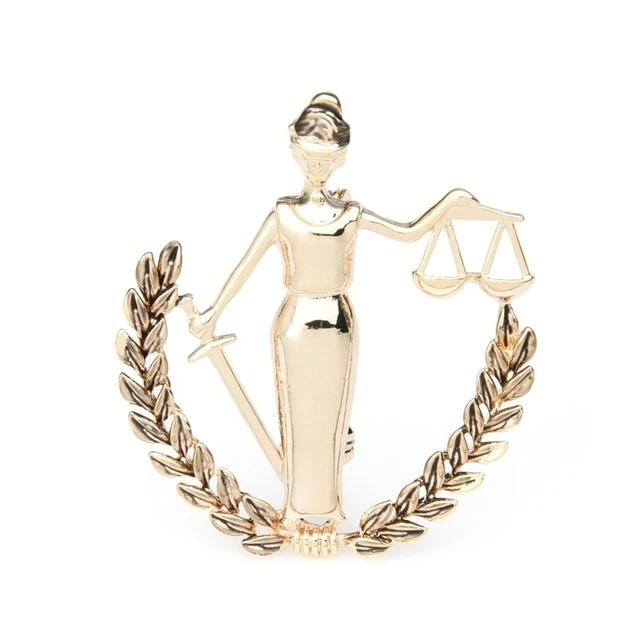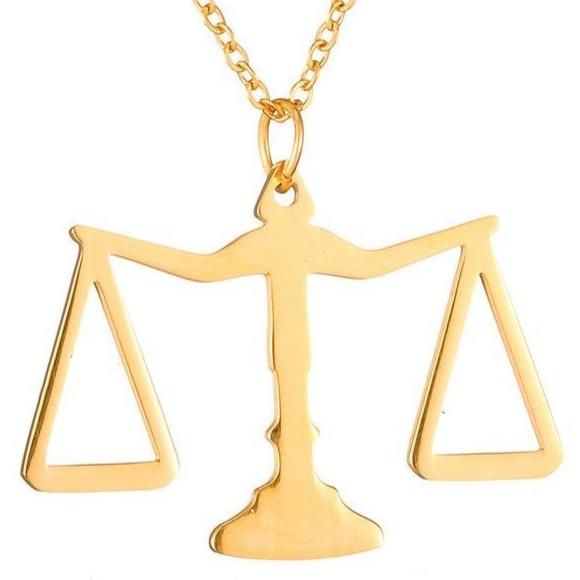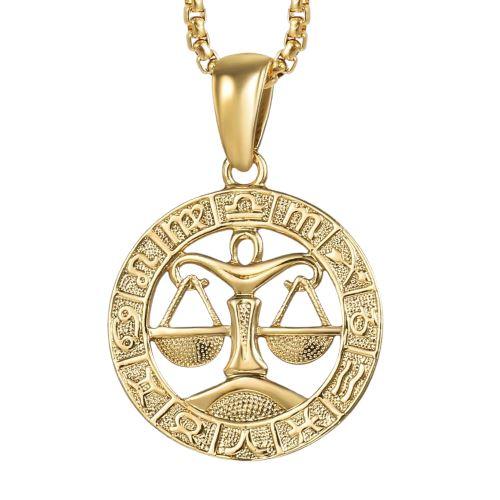The Scales of Themis: a Tool to Deliver Justice
In our modern age, we view the ancient myths and legends of ancient Greece as mere fairy tales.
However, for the ancient Greeks, this was more than just entertainment, stories that would be told to children to help them fall asleep.
Mythology was in reality the expression of a religion and deep beliefs rooted in the population. It was used, through imaginative stories, to explain the world in which we live.
The Greeks clearly understood that it was impossible to live in society without understanding the meaning of the words “law”, “order”. It is in particular to express these concepts that the image of the goddess Themis was created.
Thus, they developed a figure to hold onto in their understanding of these ideas, a sort of allegory of justice.
Themis was thus often used to make people understand the laws of men, but also those of the gods and nature.
Thanks to this, the most simple-minded had an explanation for the rules imposed on them. The most intelligent had the help necessary for the development of thought and reflection.
Contents :
Who was the goddess Themis?
Themis was primarily the goddess of justice, law and order. She personified in herself all the laws of the world thanks to which the well-being, morality and spirituality of the Greek people were preserved.
If Greek mythology is also a passion of yours or you are simply curious to learn more about the roots of our civilization, you would do well to consider the ancient Greek symbols and good luck charms that we have collected here.
Each of them is linked to a myth which, on its own scale, can help us better understand our world.
This digression having been made, let us continue.
In reality, it was also Themis who created the concept of popular assemblies. As goddess of rituals and ceremonies, Themis was responsible for organizing assemblies of the gods when a subject was debated.
She copied this model to offer it to men and thus, by extension, she brought us democracy.
Additionally, this Greek goddess was credited with immense wisdom and the gifts of clairvoyance and prophecy (her own son's name, Prometheus, means "one who foresees"). Her knowledge was such that she had access to secrets unknown even to Zeus.
This is actually not surprising: as the daughter of Gaia and Uranus, Themis was a direct descendant of the Titans and therefore had direct access to the source of the laws that created our world. From her mother, moreover, she inherited the gift of prophecy.
Because of his great wisdom, therefore, the king of the Olympian gods himself often asked him for advice. This shows the important place that women occupied in classical European cultures. .. Themis being one of the wives of the god Zeus!
This brief presentation having been made, let us now take a more serious look at some of its most notable characteristics.

Representation in Greek art
In fact, you have probably already seen representations of Themis. In addition to its place in museums and on Greek archaeological sites, statues of this ancient divinity often sit before our modern courts!
In short, our goddess is usually depicted as a beautiful young woman with her cropped hair falling over her face.
She is also shown wearing a long flowing dress and holding a sword in one hand and her famous "scales of Themis" in the other. It is moreover these symbols that this brooch scrupulously respects, very appreciated by all those for whom justice is an essential value.
Sometimes, the statues have him wear a pointed crown which hides his hair. Others put a sort of blindfold over his eyes.
Let us now analyze the meaning of each of these attributes.
A characteristic especially present since the 16th century, the fact of representing Themis with her blindfolds is in reality very significant. This voluntary blindness shows us all the fairness and impartiality demonstrated by this goddess.
Indeed, in a healthy society, justice is supposed to be the same for everyone, regardless of appearance, gender, wealth or any other characteristic.
Additionally, we can see a connection here to his powers of prophecy. Those who see the future do not feel the need to see the desires of the present world. If they have “second sight,” what can they do with the first?
Besides this, the sword (or more precisely the Roman sword) tells us that justice is there to identify the wrongs and the guilty but also to punish them.
Ironically, the sword of justice here is a double-edged blade. Does this tell us that by punishing a guilty man too harshly, society itself is committing a crime? Possible, it is in any case a food for thought.
Furthermore, it is from this attribute that the expression “resolve a problem” would come.
As for the scales of Themis, it represents the weighing of evidence, elements for the prosecution and the defense. This object is undoubtedly the best known and most used as an allegory of justice.
This is why we will take a closer look at this Greek lucky charm later in this article but, for now, let's continue to learn about the goddess Themis.

Law and order
The “law and order” that Themis had helped impose on the world was arguably along the lines of the natural order and what was appropriate, especially where family or community was concerned.
These customs were seen by most Greeks as entirely natural, although today they are considered cultural or social constructs.
This idea is supported by numerous studies and a whole bunch of work. Here, for example, is the counter-rendering of the book “The law in Greek thought from the origins to Aristotle” which can confirm this for you.
In short, in Greek mythology, Themis is therefore presented to us as the personification of law, order and divine or natural justice.
Through this link with justice, Themis was also the protector of the oppressed and the goddess of hospitality.
His very name means justice. For the Romans, moreover, the goddess corresponding to Themis is called Justitia... rather heavy with meaning, isn't it?
If this divinity was so revered (especially in Athens), this is easily understandable. In the early days of Greek civilization, Themis appeared to the inhabitants of the Hellenic peninsula in the form of a divine voice.
She thus taught the primary laws of justice and morality which should guide humanity.
These rules were simple and here is a list:
- Necessary respect for daily piety
- The duty of hospitality towards one's neighbor
- Good governance of the home and the city
- Conduct of assembly
- Regular offerings made to the gods
By following all these precepts, the Greeks were able to organize themselves into a civilization and create a grandiose culture, undoubtedly the richest of their time, whose exploits still reach our ears millennia later.

Themis: a prophetic goddess
In her time, Themis proclaimed some of the most famous prophecies.
Among these is Titanfall. Indeed, in a dream she had a clear vision: the coming war was not going to be won by force and violence by knowledge and enlightened craftsmanship which would enable feats intended to reverse the course of battles.
This came to fruition when Zeus, the leader of the Olympians, went to rescue the Cyclops and the Hecatonchires (hundred-handed creatures) from Tartarus where they had been imprisoned. The Cyclops aided the gods by building them powerful weapons (including Zeus' thunderbolt) while the Hecatonchires took advantage of their deformed nature to truly pelt the Titans with stone.
Another famous prophecy of the goddess Themis is the one where she described the "death of the giants who would try to dethrone Zeus". Something which, you must suspect, Greek mythology describes to us as having taken place a few years later.
We have cited here only two examples of Themis' prophetic abilities. We are not going to elaborate further because this is not the topic of the day. Be aware, however, that there are a whole bunch of others.
Regardless, Themis' prophecies were held in great respect by the ancient Greeks who even dedicated an oracle to her near the Cephisus River in Boeotia.

Some legends about him
Themis was a major figure in the myths and legends of the Greek people. As an allegory of justice, it occupies an important place in many stories where something superior must come to explain the balance of the world.
Others rely on her gifts as a goddess-prophet to help develop the narrative. Here are a few :
- Themis took over from her mother Gaia by occupying the Oracle of Delphi. In some versions, the goddess even created the Oracle herself. In any case, it was only subsequently that she handed over governance to Apollo.
- Nemesis was the Greek goddess of divine punishment against those who rejected the laws of the gods or who showed pride towards them. Obviously, she and Thémis often worked together. This is particularly seen in the temple of Rhamnonte (Rhamnous in Greek) where the two goddesses were worshiped at the same time.
- In Ovid's story, Themis helped Deucalion and Pyrrha, the first human beings, to repopulate the earth after the great flood that ravaged the world.
- In the story of Perseus, the hero was refused help by Atlas, who had been warned by Themis that Zeus would attempt to steal the golden apples of the Hesperides.
- Themis was also known to be an advisor to Zeus, advising the king of the gods on the conduct of men. In particular, she informed the other Olympians when one of their laws was violated by anyone.
- Themis is said to have helped the titan Leto to give birth to Apollo. Later, she feeds the child with celestial nectar and ambrosia, giving him the power and beauty we know him to have.
- According to the myth of Ovid's Metamorphoses, Themis is the one who released the Sphinx to Thebes so that it could pose its enigmas to travelers. And once Oedipus had solved the riddle and destroyed the Sphinx, the goddess was overcome with great anger and sent another wild beast to ravage the city.
- Some myths show her as the mother of Prometheus. She would then have offered him the knowledge which allowed him to escape the laws of the gods and, ultimately, to offer the sacred fire to men.
For those for whom this was not enough, here is an article which will also tell you about the goddess Themis. For others, continue reading and you will discover the secrets of a lucky charm as powerful as it is ancient...

A very famous symbol: the scales of Themis
Themis is one of the only figures in the Greek world to still be represented today in sometimes grandiose statues.
For courts around the world, it is actually not the goddess we have been talking to you about so far but Lady Justice, a symbolic character evoking impartiality and objectivity.
With its sisters Temperance, Prudence and Fortitude, it constitutes one of the four cardinal virtues taught by Christian morality.
The connection between Lady Justice and Themis is, however, direct. The Romans merged the Greek goddess with her daughter to form Justitia.
Secondly, European peoples rediscovering classical culture under the lights of the Renaissance made it the figure we know today.
Throughout its history, changes (both in terms of its personality and its fields of expertise) may have taken place.
Whatever the name by which this goddess is known, one element remains constant: the scales of Themis (which you will find here in the form of a pendant).
This object represents the balance to be struck between the individual and the rules of society, between the interests of one man and another, the prudent assessment of the facts that the judge must make, etc.
The scale of Themis would therefore be synonymous with balance and therefore with equity and justice? Interesting…

But in fact, what did Themis' scales weigh?
The Egyptian civilization had a Themis-like goddess known as Maat.
The Book of the Dead, an ancient Egyptian grimoire, presents Maat as the “goddess of unalterable laws” represented in the form of a young woman wearing a feather.
Egyptian art often shows us this feather on the scales. The second tray is supposed to receive the hearts of the deceased.
It was then only if their hearts were as light as the feather of Maat that they could access the afterlife.
Some claim that it is precisely from this tradition that the scales of Themis come, also supposed to weigh the weight of hearts and thus of guilt.
This view is interesting. If the scales of Themis weigh hearts, its judgment will undoubtedly be much better than if it weighs simple proofs. This undoubtedly increases the impartiality and correctness of the judgment.
However, this is not possible for our very human institutional justice. We must therefore find a feasible solution that would be in accordance with the great principles taught by the ancient cultures of the past...

Use as a legal scale
Today, the scale of Themis is therefore a Greek lucky charm symbolizing balance and justice. As we are not gods, we can only strive towards these two ideals with the means at our disposal.
As a general rule, everything related to scales carries this notion of seeking balance.
If you are of the sign of Libra, you must undoubtedly understand what we are talking about, and you will certainly appreciate this amulet which pays homage to Libra and its link with impartiality.
From a formal point of view, justice is an institution which ensures the application of all the codified standards that the State dictates through competent bodies.
Respect, fairness, freedom, equality before the law : justice brings together a set of essential values on which a human society must be based. Throughout history, many philosophers have attempted to provide a definition to the concept of justice.
The philosopher Aristotle defined justice as giving to each citizen according to their needs and contributions in society. The famous Greek author Plato told us in his “Allegory of the Cave” that the individual must emerge from darkness, from the cave of ignorance, because he becomes righteous as he possesses knowledge of the world.
In this sense, the individual with the most knowledge has every chance of being the most just, which reflects the idea that magistrates must have in-depth and, above all, extensive knowledge to know how to do justice in the best way..
For the German Enlightenment philosopher Kant, the justice of a state must be based on three fundamental principles: the freedom of individuals, equality between them and the independence of each member of a community.
Justice is therefore one of the most important social, moral and democratic values. This is a virtue that all individuals must try to put into practice consistently, the ideal (unfortunately unattainable) being that everyone acts in everyday life with rectitude and impartiality.
To achieve this, justice must be a value instilled by the family, reinforced by public education and protected by state institutions.
Let us also point out that modern judicial institutions use a whole bunch of symbols of sometimes very ancient origins.
We have mentioned some such as the scales or the sword, but others such as the tables of the law have not been mentioned here. If the subject interests you and you want to go further, here is an article which will present to you the main emblems that you will find in our courts.

Themis's scale: always balanced?
Traditionally, the scales of Themis are represented in balance.
As we just mentioned earlier, this symbolizes the fair and objective consideration of all the evidence that the judge must make, without showing bias in one direction or the other.
In certain circumstances, however, the balance may be unbalanced, in this case representing the weighting that can be made between various elements. Sometimes in fact, fair judgment requires giving more importance to one element rather than another.
The role of magistrate therefore requires knowing how to make the best judgment possible.
Obviously, this state of affairs leads to certain excesses and a risk of arbitrariness and partiality. Thus, some sometimes use the unbalanced scale of Themis as an allegory of justice yes, but of an unjust justice which would have favored this or that party.
This symbol can therefore be used to support a political or cultural comment aimed at denouncing an injustice.

Conclusion: what the Themis scale can do for you
From birth to death, human beings are governed by reason, ethics and morality.
Ancient civilizations (Roman and Greek in particular) attached capital importance to them. Each of these three ideas is in fact found in the balance of Themis.
By ethics we mean the principles that help us distinguish right from wrong. Reason allows us to distinguish truth from falsehood. Values and morals are what allow us to find the energy and courage to apply all of these in our lives.
Without morality, all the ethics and reason in the world will be of no use to you. This is one of the essential messages carried by the scale of Themis.
In short, these three qualities allow men to found just societies in which a fair law applies.
We thus develop systems capable of directing and guiding individuals in the right direction.
Between animal laws (deeply unjust) and divine laws (literally perfect), we strive to construct human laws that take reality into account. Each symbol of justice aims to express these ideas.
Without claiming to be perfect, the judicial system seeks to tend towards objectivity, the fairest verdict and justice. Here again, the link with the goddess Themis is quite obvious…
And you, do you want to develop these qualities at home?
Lucky charms featured in this article

Brooch of Themis Carrying Sword and Scales
See more
Pendant of the Scales of Themis
See more
Zodiacal Amulet Bearing the Scales of Justice
See more

